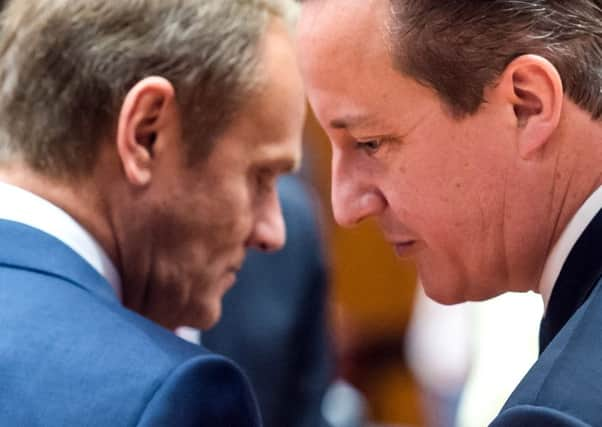Leaders: Cameron's got a ticket to ride, destination unknown


David Cameron must be feeling pleased with himself as he clutches in his hand the piece of paper that represents what he believes is his ticket to Britain staying in the European Union.
Concessions in the new draft deal mean he can now throw his full weight behind continuing the alliance ahead of the crucial summit where member countries vote on the proposals later this month.
Advertisement
Hide AdAdvertisement
Hide AdHe would like us to believe it was his hard bargaining and the threat of our country’s departure from the EU community that secured the new draft deal, which he claims will deliver the “substantial change” he has been shouting for.
And on the surface, it looks like the Prime Minister has achieved most of his goals.
Concessions laid out include an “emergency brake” on in-work benefits for migrants and a legally binding guarantee that the UK is not committed to further political integration within the union.
Increased powers for national parliaments to block new EU laws have also been offered up, as well as a special mechanism designed to safeguard non-eurozone countries.
The draft treaty may have fallen short with respect to Mr Cameron’s hopes for reforming the rules to stop child benefit payments claimed by migrants being sent outside the UK, but he also scored some unexpected wins – particularly with regard to security.
The draft deal contains proposals for a tightening of loopholes such as sham marriages that allow access to Europe and new rules that will make it easier to bar terror suspects from entering the country.
This package of measures should go someway towards appeasing the doubters, but has the PM really altered Britain’s relationship with our European counterparts fundamentally? Obviously he is heralding the draft deal as a victory, and will use it to forward his own aims.
But he was always going to insist the negotiations had gone his way. Many of the reforms contained in the statement were moves member nations were already considering on their own behalf.
Advertisement
Hide AdAdvertisement
Hide AdIt must also be asked: will this represent a step change in voting intentions ahead of the referendum? In truth, probably not. The number of people who will be swayed by Cameron’s deliberations is likely to be modest.
The next step for the Tory leader is to drum up sufficient support from fellow EU leaders to see the package outlined by European Council president Donald Tusk ratified in Brussels. He has just over a fortnight to do that, beginning with a visit to Tusk’s home country Poland this week.
If he is successful, we can expect a referendum on the future of Britain’s membership in the summer. The PM has got until the end of next year to stage the vote but this June is being hinted at as favourite.
However, whether the new treaty will really represent “the best of both worlds” – as Mr Cameron claims – when put to the test, remains to be seen.
Trumped – ‘the Donald’ is beaten
There is an important lesson to be learned as results of the first vote in the race for the White House sink in.
Donald Trump had been tipped to come out on top after leading the polls over the past couple of weeks.
But Texas senator Ted Cruz has claimed a victory for “conservative grass roots” after scooping more than a quarter of the vote in the Iowa Republican caucuses, comfortably beating favourite “The Donald”.
Even more unexpected was third-placed Marco Rubio coming in only a single percentage point behind the outspoken billionaire.
Advertisement
Hide AdAdvertisement
Hide AdThe outcome in Iowa has introduced a new element of uncertainty and excitement to the battle for candidacy, and proves there is still everything to play for. More than that, though, it represents the first time the people have spoken out against the establishment. Where the tycoon Trumpster, who has bragged of self-funding his own campaign – whilst bemoaning the lack of credit he received for the fact and tweeting “not worth it” – stepped out of a private jet to hit the campaign trail, his opponent Cruz has been credited with winning the state “the old-fashioned way”. He visited each and every one of Iowa’s 99 counties at least once, travelling by car and bus to meet the people.
The turnout for Cruz mimics the situation being played out here with Labour, where widespread support for leader Jeremy Corbyn from the public stands in stark contrast to his level of popularity within party ranks.
It should act as a strong reminder to any party of the importance of keeping in touch with its grass roots. Politicians who live by the polls can just as easily fall victim to them.